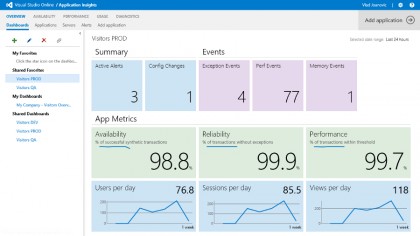Microsoft's Visual Studio Online set to make it big in the enterprise arena
Encryption, custom workflows and better reporting are coming
As well as the security, privacy and auditing improvements Visual Studio Online is getting, it will also offer more customisation. "When you get into large organisations, they inevitably want to customise things – they don't want to use the out-of-the box workflows. For adopting Visual Studio Online inside Microsoft, we have some customisation requirements; you have to be able to create a custom field on work items, and have custom types and flows, so that's something we're working on hard right now. I expect sometime in the middle part of this year we will announce a public preview of our process customisation capabilities on the cloud," Harry predicted.
On the other hand, simplicity can be an advantage. "We've had quite a few companies who, when given the keys go crazy and invent something they later regret. Some customers who've made the move to the cloud have actually said 'we're glad you don't support all this because it forced us to get rid of the crazy customisation we've done!'"
Businesses with a lot of developers may find some longer-term workflow developments more useful. "We're making some investments to really bring the open source style of collaboration and coding inside businesses, where you have transparency and contribution and sharing of code across the organisation. That means you'll be able to identify experts and what they've worked on."

Nadella's vision
Those are the kind of features Microsoft is looking for itself, to deliver Nadella's idea of 'internal open source' and they'll start showing up over the next year or so, says Harry. "Code search is a piece of it – that enables you to go find assets you might be able to share. There's work that we're doing around code reviews and pull requests with Git that enables that cross-organisation sharing. And then a bunch more features will come along that really make that real."
Probably before that, Visual Studio Online will also get more powerful reporting features. If you use Team Foundation Server, you can use SQL Server Analysis and Reporting Services. "That means you can use Excel and Power BI and all that stuff to create arbitrary reports over TFS; we don't yet have that level of depth reporting in the cloud," says Harry. "We have what we call simple charting – you can create snapshot charts, bar charts and tables, simple trend charts…" But larger businesses moving from TFS are going to want the kind of reports they're familiar with.
The more of those features Visual Studio Online adds, the more large businesses will consider the service instead of running TFS themselves. Harry puts the recent level of interest down to the fact that smaller teams in those businesses have found the service useful.
"It's about trying it and seeing that the world doesn't fall apart. If I'm a business, I can try it in small departments and see that it works; I didn't lose all my IP, the service wasn't down all the time, it did work and it was reliable and it was often more reliable than the service I could run myself." It's about getting comfortable with cloud services. "Every enterprise I talk to knows they're going to cloud. Everybody knows cloud is their future – they're all just trying to figure out what their path is. It's about time, experience and comfort."
Sign up to the TechRadar Pro newsletter to get all the top news, opinion, features and guidance your business needs to succeed!
Mary (Twitter, Google+, website) started her career at Future Publishing, saw the AOL meltdown first hand the first time around when she ran the AOL UK computing channel, and she's been a freelance tech writer for over a decade. She's used every version of Windows and Office released, and every smartphone too, but she's still looking for the perfect tablet. Yes, she really does have USB earrings.